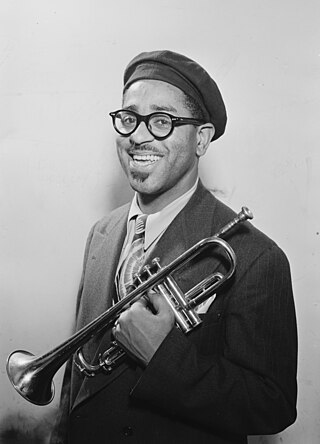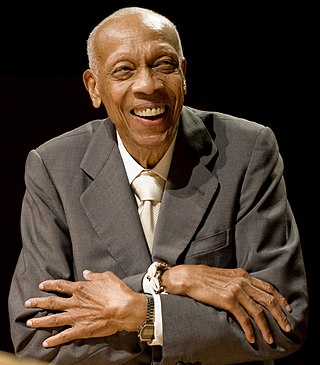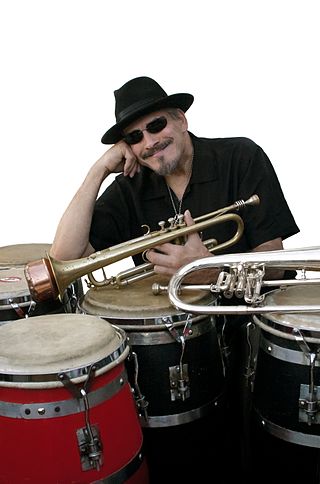
John Birks "Dizzy" Gillespie was an American jazz trumpeter, bandleader, composer, educator and singer. He was a trumpet virtuoso and improviser, building on the virtuosic style of Roy Eldridge but adding layers of harmonic and rhythmic complexity previously unheard in jazz. His combination of musicianship, showmanship, and wit made him a leading popularizer of the new music called bebop. His beret and horn-rimmed spectacles, scat singing, bent horn, pouched cheeks, and light-hearted personality have made him an enduring icon.

Arturo Sandoval is a Cuban-American jazz trumpeter, pianist, timbalero, and composer. While living in his native Cuba, Sandoval was influenced by jazz musicians Charlie Parker, Clifford Brown, and Dizzy Gillespie. In 1977 he met Gillespie, who became his friend and mentor and helped him defect from Cuba while on tour with the United Nations Orchestra. Sandoval became an American naturalized citizen in 1998. His life was the subject of the film For Love or Country: The Arturo Sandoval Story (2000) starring Andy García.

Machito was a Latin jazz musician who helped refine Afro-Cuban jazz and create both Cubop and salsa music. He was raised in Havana with the singer Graciela, his foster sister.

Dionisio Ramón Emilio Valdés Amaro, better known as Bebo Valdés, was a Cuban pianist, bandleader, composer and arranger. He was a central figure in the golden age of Cuban music, especially due to his big band arrangements and compositions of mambo, chachachá and batanga, a genre he created in 1952.

Israel López Valdés, better known as Cachao, was a Cuban double bassist and composer. Cachao is widely known as the co-creator of the mambo and a master of the descarga. Throughout his career he also performed and recorded in a variety of music styles ranging from classical music to salsa. An exile in the United States since the 1960s, he only achieved international fame following a career revival in the 1990s.

Francisco Javier Errando Mariscal, better known as Javier Mariscal, is a Spanish artist and designer whose work has spanned a wide range of mediums, ranging from painting and sculpture to interior design and landscaping.
Arturo "Chico" O'Farrill was a Cuban composer, arranger, and conductor, best known for his work in the Latin idiom, specifically Afro-Cuban jazz or "Cubop", although he also composed traditional jazz pieces and even symphonic works.

Luciano Pozo González, known professionally as Chano Pozo, was a Cuban jazz percussionist, singer, dancer, and composer. Despite only living to the age of 33, he played a major role in the founding of Latin jazz. He co-wrote some of Dizzy Gillespie's Latin-flavored compositions, such as "Manteca" and "Tin Tin Deo", and was the first Latin percussionist in Gillespie's band. According to Rebeca Mauleón, "Few percussionists have played as integral a role in shaping Latin music as Luciano 'Chano' Pozo González".

Fernando Rodríguez Trueba, known as Fernando Trueba, is a Spanish filmmaker, writer, producer and book editor.
Ignacio Berroa is a jazz drummer.
Mario Rivera was a Latin jazz saxophonist from the Dominican Republic. Besides saxophone, Rivera played trumpet, flute, piano, vibraphone, congas, and drums.
Carlos Valdés Galán, better known as Patato, was a Cuban conga player. In 1954, he emigrated from La Habana to New York City where he continued his prolific career as a sideman for several jazz and Latin music ensembles, and occasionally as a bandleader. He contributed to the development of the tunable conga drum which revolutionized the use of the instrument in the US. His experimental descarga albums recorded for Latin Percussion are considered the counterpart to the commercial salsa boom of the 1970s. Tito Puente once called him "the greatest conguero alive today".

Rita Aurelia Fulcida Montaner y Facenda, known as Rita Montaner, was a Cuban singer, pianist and actress. In Cuban parlance, she was a vedette, and was well known in Mexico City, Paris, Miami and New York, where she performed, filmed and recorded on numerous occasions. She was one of Cuba's most popular artists between the late 1920s and 1950s, renowned as Rita de Cuba. Though classically trained as a soprano for zarzuelas, her mark was made as a singer of Afro-Cuban salon songs including "The Peanut Vendor" and "Siboney".

Guillermo Barreto was a Cuban drummer and timbalero. He was a major figure in the Cuban music scene for more than fifty years and one of the first drummers in Cuba to play Afro-Cuban jazz.
Michael Philip Mossman is an American jazz trumpeter.

Jerry González was an American bandleader, trumpeter and percussionist of Puerto Rican descent. Geraldo, his father, was a singer in a band and worked for Las Villas, a chain of stores selling Latin American products. Jerry, who liked the trumpet and studied it carefully, but also the congas was a member of Cal Tjader Callen Radcliffe Tjader Jr. an American Jazz musician, known as the most successful non-Latino of Latin Jazz. Together Jerry Gonzalez with his brother, bassist Andy González, played an important role in the development of Latin Jazz during the late 20th century. During the 1970s, both played alongside Eddie Palmieri and in Manny Oquendo's Conjunto Libre, and from 1980 to 2018 they directed The Fort Apache Band. From 2000 to 2018, Jerry González resided in Madrid, where he fronted Los Piratas del Flamenco and El Comando de la Clave. In October 2018, he died of a heart attack after a fire in his home in Madrid.

Arturo O'Farrill is a jazz musician, the son of Latin jazz musician, arranger and bandleader Chico O'Farrill, and pianist, composer, and director for the Afro Latin Jazz Orchestra. He is best known for his contributions to contemporary Latin jazz, having received Grammy Awards and nominations, though he has trained in other forms such as free jazz and experimented briefly with hip hop.

Afro is a studio album by the jazz trumpeter Dizzy Gillespie. It was released in November 1954 through Norgran Records. Gillespie worked with many Cuban musicians on the album.

Lágrimas Negras is a 2003 album by Cuban pianist, bandleader, composer and arranger Bebo Valdés and Spanish flamenco singer Diego el Cigala. Lágrimas Negras is a fusion of Cuban rhythms and flamenco vocals, produced by Spanish composer, producer and guitarist Javier Limón and book editor, screenwriter, film director and producer Fernando Trueba and released by Calle 54 Records and BMG Music Spain.

They Shot the Piano Player is a 2023 adult animated docudrama film directed by Fernando Trueba and Javier Mariscal. Centred around the real-life disappearance and presumed murder of Brazilian pianist Francisco Tenório Júnior in 1976, the film stars Jeff Goldblum as an American music journalist investigating Tenório's case.















